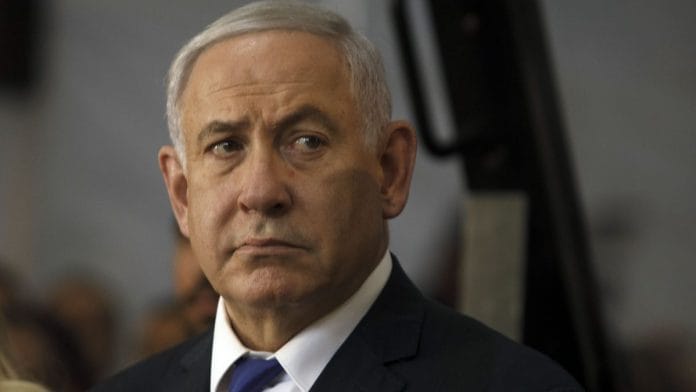Tel Aviv: They’ve been coming by the thousands, packing Tel Aviv’s main square, chanting outside the prime minister’s residence, and unfurling black flags from bridges spanning Israel’s highways. All with a single message: We’re fed up with you, Bibi.
Rarely has public dissatisfaction with Prime Minister Benjamin “Bibi” Netanyahu been so high, as a resurgent coronavirus outbreak, mounting unemployment and the corruption allegations against him come together in a flood of discontent. Polls show his Likud party sinking, and only about 30% of Israelis trust his handling of the health crisis.
The anger is weakening Netanyahu precisely at a time when the optics of appearing strong and admired would serve him best. Next week, with his political survival and a possible jail sentence at stake, his multi-layered corruption trial shifts into higher gear, with a possible scheduling of future hearings where he’ll take the stand.
The shift in public sentiment came swiftly. Netanyahu initially won high marks both at home and abroad for assertive decisions that kept both virus deaths and infections down. But the reopening of the economy — done not in the gradual, measured way that was promised, but in a burst of celebration (Go out and “have fun,” he said) — has brought cases shooting up again. New daily infections that had dwindled to single digits in May topped 1,700 this week.
The prime minister was forced to concede in a rare public apology last week that he had erred. The new 90 billion shekel ($26.1 billion) economic aid package he announced at the same time did little to mollify protesters who say his fractious coalition government — formed explicitly to tackle the health emergency — has managed the crisis ineptly and doesn’t understand the public’s pain.
“The government is so disconnected with the economic situation,” said Aviad Ben Sadon, a consultant and leader of an independent contractors group. “They think always about themselves. They think, ‘What is going to be our salary, my position in the politics.’ They’re not thinking about us.”
Little more than half of the government’s initial rescue aid, announced in late March, has been disbursed to needy workers and businesses, a government official told parliament on Monday as the crisis deepens and talk of a possible new lockdown abounds.
There have been some 43,000 confirmed coronavirus cases, including about 375 deaths, in the country of 9 million.
The mounting sense that the government is out of touch has only been fueled by the personal conduct of the premier and several key allies. While businesses were collapsing and unemployment stood at a menacing 21%, Netanyahu was busy pressing parliament to give him a tax refund worth hundreds of thousands of shekels. He parried the consequent uproar by saying the “timing” was off.
Also read: Benjamin Netanyahu is the Michael Jordan of Israeli politics
A minister without portfolio in his bloated cabinet dismissed claims that some Israelis are going hungry as “bullsh*t.” It wasn’t lost on critics that the minister doesn’t have a clearly defined job.
Netanyahu’s health minister, meanwhile, went to a birthday bash for his wife just after announcing impending new restrictions on gatherings.
A poll Sunday night on Channel 13 showed Likud winning just 33 seats in Israel’s 120-seat parliament, down from 40 just weeks ago. Another survey by the Israeli Democracy Institute showed 75% of Israelis are dissatisfied with the government’s functioning during the crisis.
Yet while Netanyahu’s on the ropes — as he’s been before — the same coronavirus that’s hurting him will also preserve his government, at least for now. Neither he nor his coalition partners have anything to gain from going to early elections at this point because they’d either lose seats or maintain their current strength, polls show.
Netanyahu would have no incentive to resign now, either, since he sees an advantage to going to trial as Israel’s leader, and not as an ordinary citizen. Hanan Kristal, political commentator for Israel Radio, predicts the crunch time will come in November 2021, when Netanyahu is scheduled to turn over the premiership to Defense Minister Benny Gantz under the power-sharing pact underpinning their government. Many in Israel have suspected the prime minister would find a ruse to bring the government down and call elections rather than honor the agreement.
“In November next year is the rotation, by then we’ll see where this all goes,” Kristal said.
In the meantime, Israelis are hitting the streets. Demonstrations have included unusually large turnouts outside the prime minister’s residence in Jerusalem and protests on bridges demanding that Netanyahu resign over the multiple graft cases against him. About 50 people were arrested on Tuesday night in clashes with police after a raucous rally where some anti-corruption protesters carrying torches attempted to rush the barricades outside Netanyahu’s home.
“For Netanyahu, it’s starting to look like the perfect storm against him because it’s the health care, it’s the economy, it’s the government,” said Mitchell Barak, a pollster and former Netanyahu adviser. “The prime minister is not keyed into what’s going on.”- Bloomberg
Also read: Netanyahu is downgrading Israeli democracy under cover of coronavirus






